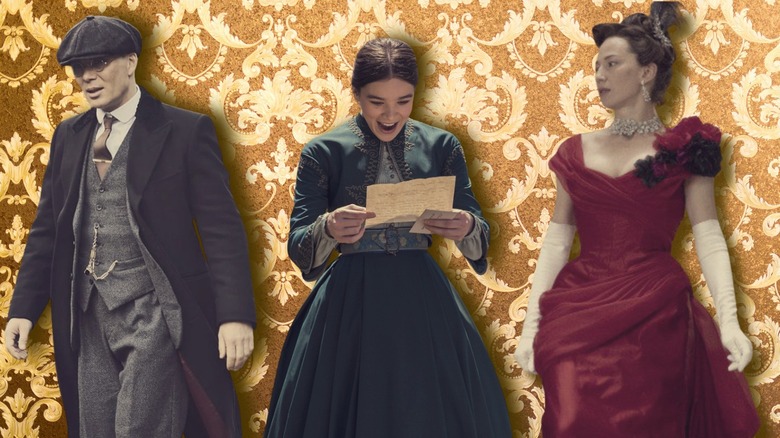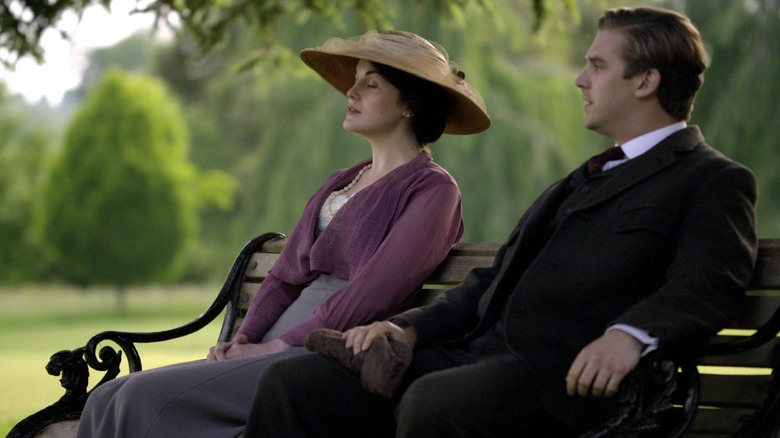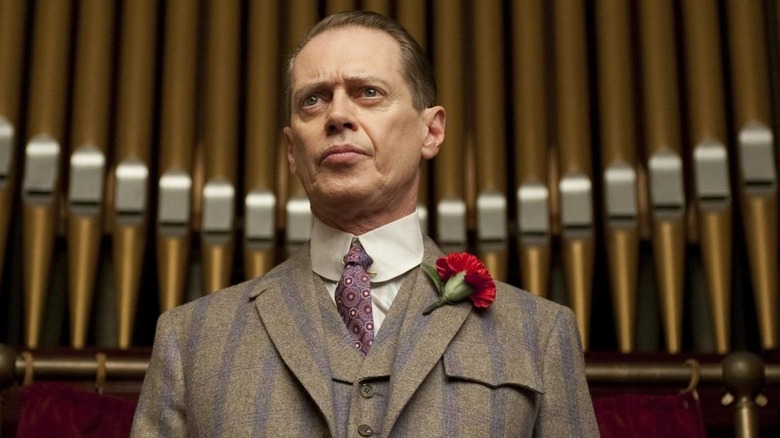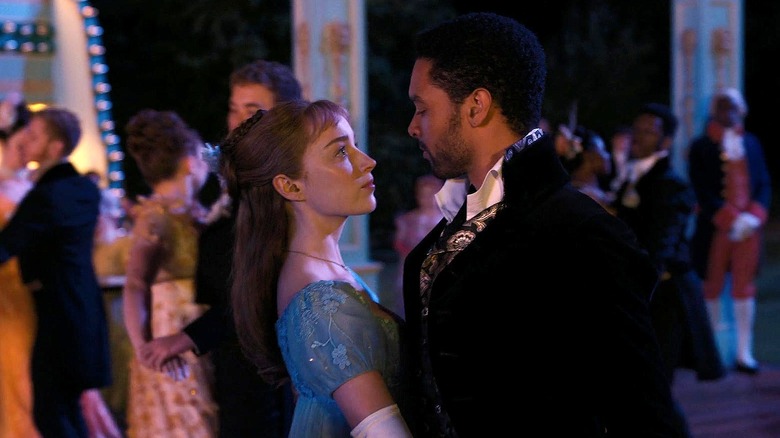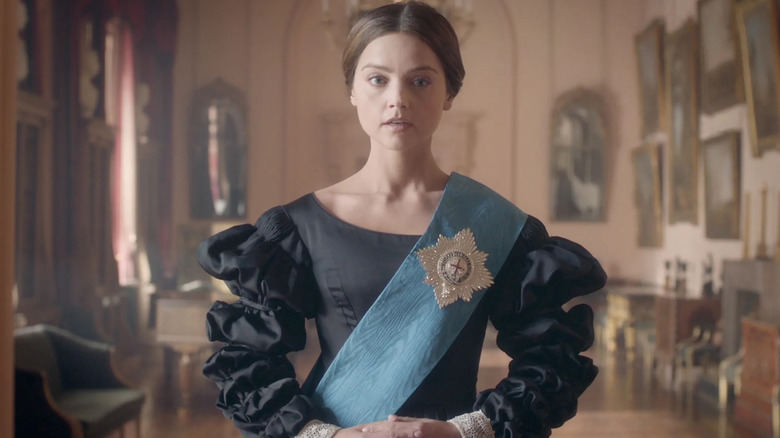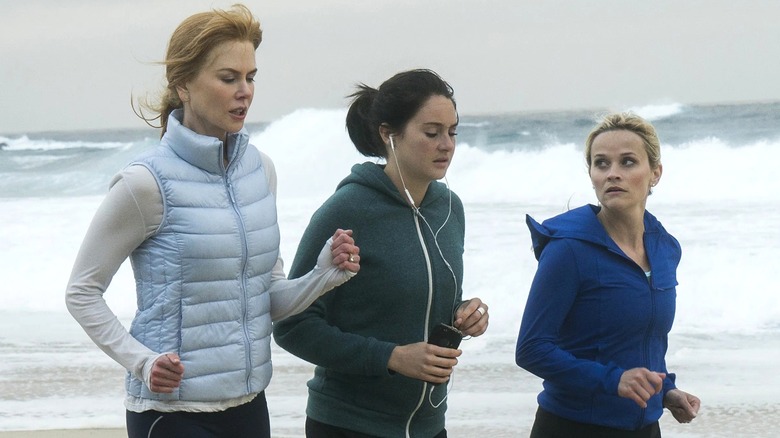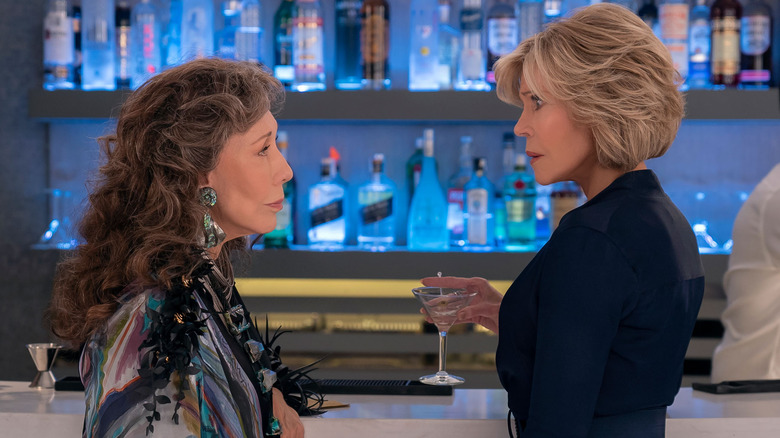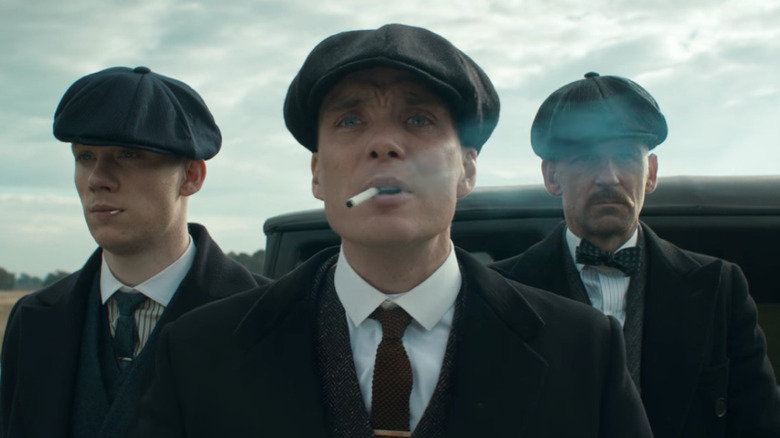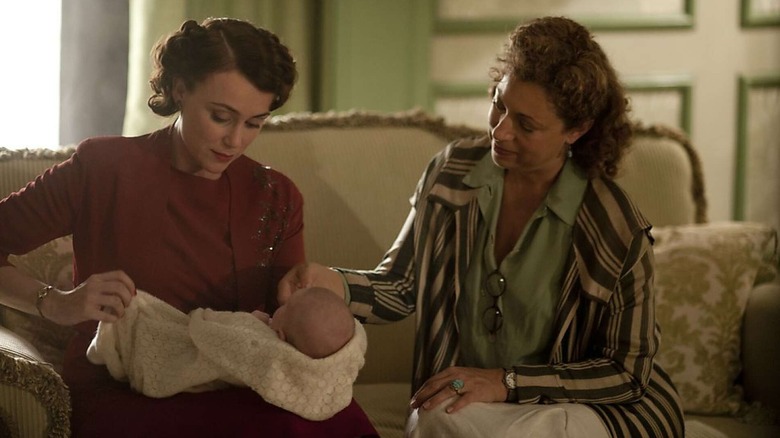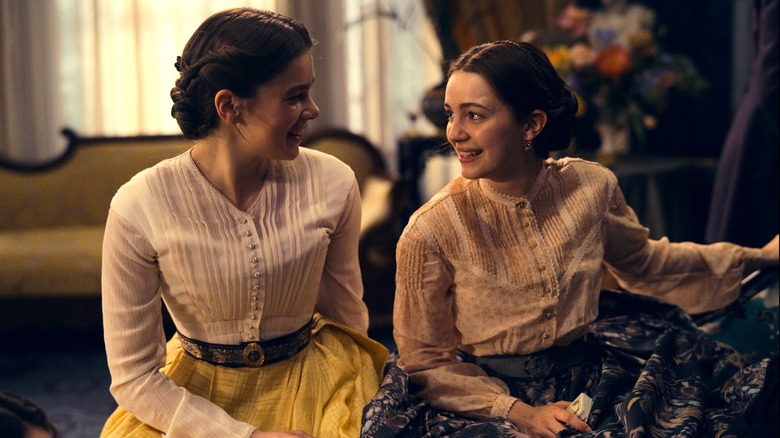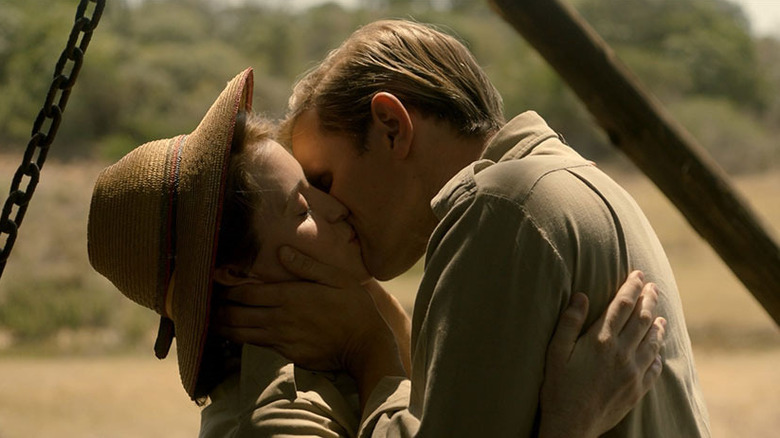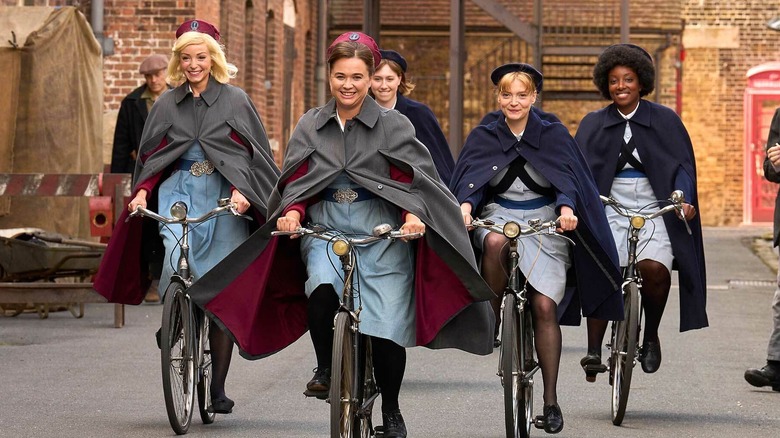11 Best TV Shows Like The Gilded Age
It would be very easy to recommend a good period film to a fan of the genre, as audiences who love to see the past brought to life on screen are simply spoiled with choice amongst the best period piece movies ever made, let alone just any that are watchable. They can turn to the breezy, artful craft of "Pride and Prejudice" or the many haunting twists and turns of "Crimson Peak." Yes, there are a lot of period pieces that have come and gone from theaters, but there are far fewer that oblige the genre in television, and most of what exists has only been created and released in the past few decades.
Fans of "The Gilded Age" might be unsure where to start in looking for another TV show that feels similar, especially because there are plenty of things to love about the HBO Max series that go well beyond its era-appropriate charms. Some of the shows on our list have a similar reverence for history and incite the excitement that comes from seeing on-screen depictions of past eras. Others might provide viewers with the sort of friendships and familial relationships that "The Gilded Age" shows, not to mention its focus on characters who might occupy a blind spot in history or even contemporary society. Not everything on this list is gilded, but they all have at least a few sparkles.
Downton Abbey
"The Gilded Age" creator Julian Fellowes' biggest television success is "Downton Abbey," a show about a grand country estate in England. The "Downton Abbey" timeline extends well into the 20th century, but the first episode of the series takes place the morning after the Titanic went down. The show follows Robert Crawley, the Earl of Grantham (Hugh Bonneville), and his aristocratic family as they go about their lives at the turn of the century. Robert married an American heiress named Cora (Elizabeth McGovern), and they have three grown daughters, Mary (Michelle Dockery), Edith (Laura Carmichael), and Sybil (Jessica Brown Findlay). The show also follows the estate's many servants and working people, as well as Robert's middle-class heir, Matthew Crawley (Dan Stevens).
"Downton Abbey" takes place in England and is set a few decades after "The Gilded Age," but the two shows are very similar in both content and tone. Fellowes loves his characters, and while both series are jam-packed with moments of misfortune, there are just as many miracles to offset the tragedies that befall his characters. The only unfortunate circumstances that are permanent in "Downton Abbey" are the one or two significant character deaths that occur, and these are usually driven by an actor's desire to move on to another project or a disinterest in becoming a series regular.
Boardwalk Empire
Enoch "Nucky" Thompson (Steve Buscemi) is the main character of "Boardwalk Empire," a historical show set in Atlantic City, New Jersey, during the prohibition era of the 1920s and '30s. Season 3 of "The Gilded Age" has only just begun to touch on the prohibition movement through Ada (Cynthia Nixon), but it will continue to gather momentum until the ratification of the 18th amendment in 1919, which prohibited the manufacture, sale, or transportation of alcoholic beverages in the United States. While the amendment was popular enough with Americans to be ratified, it also inspired a wave of criminal enterprise dedicated to the illegal production and distribution of alcohol — one of the main focuses of "Boardwalk Empire."
"Boardwalk Empire" has many elements similar to "The Gilded Age." For one thing, they only take place a few decades apart. And while both shows are fictional, they both also touch on real historical events, places, and people. "Boardwalk Empire's" Nucky is actually based on a real man (Enoch L. Johnson) who became a prominent New Jersey politician, partially thanks to his involvement with bootlegging operations. Unlike "The Gilded Age," however, "Boardwalk Empire" depicts many brutal deaths due to its focus on the seedier elements of early 20th-century America, giving the show a much more cynical outlook overall.
Bridgerton
Some period shows and films, including "The Gilded Age," place a heavy focus on historical accuracy. From costume to content, the creators of these shows are dedicated to giving audiences an accurate picture of what life was like in the past. "Bridgerton" is not a product of one of these creators. Instead of attempting to avoid anachronisms, "Bridgerton" leans into them cheekily, with string arrangements of pop songs, over-bright and overly ornate costumes, and a decision to rewrite the Regency era of England as if race and ethnicity were far less influential on societal standing and basic acceptance. Of course, "Bridgerton" does miss the mark somewhat by boldly defying historical accuracy in some circumstances while attempting to utilize historical restrictions for the sake of plot in others.
Nonetheless, "Bridgerton" is the leading title in romantic historical fiction on TV right now, and while Julian Fellowes has been successful in presenting beautiful love stories to his viewers through couples like "Downton Abbey's" Anna (Joanne Froggatt) and Bates (Brendan Coyle), and Matthew and Mary, he doesn't focus on romance more than any other relationship dynamic. "Bridgerton" isn't perfect, but it will scratch an itch for any viewer looking for a little more romance and an earlier setting. Also, it is way more explicit; "Bridgerton" is well-known for its steamy love scenes, which are definitely not something audiences will find in "The Gilded Age."
Victoria
People love stories about aristocrats, especially ones that follow aristocratic characters in past eras. "Victoria" decided to capitalize on this fascination and offer audiences the chance to follow not just any noblewoman, but one of the most famous and successful monarchs in British history. Victoria became Queen of the United Kingdom when she was eighteen years old and had one of the longest reigns in history (second only to that of Queen Elizabeth II). She reigned over the Industrial Revolution and saw the United Kingdom through multiple wars and domestic conflicts. In "Victoria," audiences get to watch all of that as well as moments of Victoria's (Jenna Coleman) personal life with her husband, Albert (Tom Hughes), and the lives of Buckingham Palace's servants and aristocrats-in-waiting.
There is definitely less of a focus on the servant class in "Victoria," but the love story between the queen's assistant dresser, Nancy (Nell Hudson), and the palace chef, Mr. Francatelli (Ferdinand Kingsley), stands out as a particularly compelling plotline. Most of the show's sizzle comes from the dynamic between Victoria and Albert, though, as Coleman and Hughes have excellent chemistry and work hard to emphasize the complexity of their characters' relationship. This show is primarily British but can be watched with a PBS subscription or through Amazon Prime.
Big Little Lies
It would be difficult to recommend a list of only period TV shows similar to "The Gilded Age," as there isn't a huge pool to draw from, but there are many themes explored in the HBO series that are timeless. Small, absurdly wealthy communities are fascinating to many people; such is the case in "The Gilded Age," and such is the case in "Big Little Lies." New York City during the Gilded Age and modern-day Monterey, California, don't have much in common, but they are both home to a lot of very rich people and their often scandalous secrets. In both communities, involvement in said scandals usually results in social exile, despite the fact that most of the people forcing that exile are fed and fascinated by controversy.
"Big Little Lies" was a smash hit, with a non-linear plot structure and a large, confident ensemble of actors, including Reese Witherspoon, Nicole Kidman, Adam Scott, Zoe Kravitz, and Alexander Skarsgård, among others. The show goes back and forth between the past— a depiction of the daily lives of its characters leading up to a big fundraiser for the fancy school most of the area's children attend — and the present, represented by police interviews with various witnesses to a wild, scandalous crime. Originally conceived as a miniseries, the show returned for a well-received Season 2 (there's not much available information about "Big Little Lies" Season 3), though only Season 1 was based on Liane Moriarty's bestselling novel of the same name.
Grace and Frankie
One of the biggest draws of "The Gilded Age" is its stellar cast of well-regarded acting vets. None of the show's leads are megastars, but all of them are excellent performers who have earned consistently positive reactions from audiences and industry professionals throughout their careers. Carrie Coon, for example, plays a cunning society woman named Bertha Russell; tirelessly, she works to legitimize the status of "new money" families in the eyes of "old money" New York City. Her neighbors across the street are two such "old money" sisters, Ada Brook (Cynthia Nixon) and Agnes Van Rhijn (Christine Baranski), attempting to navigate the second half of their lives as a longtime spinster and widow to a man she barely tolerated, respectively. Ada and Agnes' relationship is one of the most compelling in the show and gives both Nixon and Baranski a chance to shine.
"Grace and Frankie" is actually very different from "The Gilded Age" in both content and tone. It's a comedic drama that follows social rivals Grace (Jane Fonda) and Frankie (Lily Tomlin) after both are left by their husbands and have fallen in love with each other. Grace and Frankie aren't sisters, but they are thrown together in a similar way, forced to be in each other's lives via the most personal parts of who they are, but still constantly clashing. If Agnes and Ada's dynamic has given you a hankering for more complex relationships between older women, "Grace and Frankie" can serve very well.
Peaky Blinders
"Peaky Blinders" is a British television show set almost immediately following the end of World War I, referred to as "The Great War" in the show, in Birmingham, England. While most of the main characters in the show are fictional, "Peaky Blinders" is based on a real-life street gang of youths who operated in Birmingham around the turn of the century. Luckily, the gang in the show is far more interesting, representing a criminal family dynasty led by the second oldest brother, Tommy Shelby (Cillian Murphy). Murphy, who recently won a Best Actor Academy Award for "Oppenheimer," is mesmerizing to watch, with a slightly-too-modern haircut and an aura that always whispers that everything is going to plan.
"Peaky Blinders" is about a family that's actually not totally dissimilar to the two main families in "The Gilded Age." They have a dynasty to protect, a great deal of both power and ambition, and they're magnets for talent and trouble. There is a certain musicality to "Peaky Blinders" that "The Gilded Age" lacks, a stylized viewpoint that asks for the consideration of many more shades of gray in its character arcs than in Julian Fellowes' HBO series. "Peaky Blinders" is more focused on character exploration, whereas "The Gilded Age" focuses more on contextualizing its characters in history. That said, it's still atmospheric enough to satisfy your craving for a period setting.
Upstairs Downstairs
It's highly unlikely that Julian Fellowes didn't draw at least some inspiration for "Downton Abbey" from 1971's "Upstairs Downstairs," a soapy British drama set in early-1900s London that follows the ups and downs of a wealthy family and their entourage of servants. The show accurately depicts various historical events that took place in London from 1903 through 1930, showing the progression of social mobility through interactions and dynamics between masters and servants.
In 2010, BBC ordered a two-series program that picked up the "Upstairs Downstairs" story six years after its original finale, offering an interesting look into Britain at war through a new family living in the same house. The new family in Bellamy House, the Hollands, are a young couple suffering the grief of a miscarriage, hoping to renovate the house and take care of their families. Though the tone of the original is quite different from the more recent reboot (seriously, it has a pretty dark ending), between "Downton Abbey" and "Upstairs Downstairs," it's possible to get a fairly clear picture of what life might have been like for many aristocrats and servants in England at the turn of the 19th century.
The 2010 version of the show also features a young Claire Foy as the troublemaking Lady Persephone Towyn, and some viewers should recognize the Duke of Kent as Blake Ritson, the same actor who plays Oscar van Rhijn on "The Gilded Age."
Dickinson
Another period television show, this one, like "The Gilded Age," is actually set in America. "Dickinson" follows the young poet Emily Dickinson (Hailee Steinfeld) as she navigates her artistry and her personal life in 19th-century Amherst, Massachusetts. Steinfeld is immediately comfortable and confident in the role, no doubt thanks to her successful early acting turns as a teen. She portrays Emily as quite human, though she's occasionally overcome by a latent fascination with intensity and death. "The Gilded Age" would never make such a playful choice as to have its personification of death played by Wiz Khalifa, but that's part of what makes "Dickinson" such a delicious show to binge-watch.
"Dickinson" takes place only a few decades before the start of "The Gilded Age," but it feels further back than that thanks to its stark, romantic, New England setting. The core relationship between Emily and her best friend and lover, Sue (Ella Hunt), is rich and complex, especially because she's also Emily's sister-in-law, what with being married to Emily's older brother, Austin (Adrian Blake Enscoe). But don't be fooled by Emily's episodes of surreal perception and the intensity of her love for Sue — "Dickinson" is still a historic comedy. Jane Krakowski is a wonderful train wreck as Emily's mother, and the show delights in featuring interactions with historical figures, often offering them an opportunity to get down from their pedestals.
The Crown
Perhaps the most thoughtful merging of historical contextualization and heavy character work, "The Crown" is truly the crown jewel of period TV dramas. The Netflix original, which offers an imagined window into nearly the entire reign of Queen Elizabeth II, has won a total of 24 primetime Emmys, including acting wins for its roster of impressive stars, including Olivia Colman (Queen Elizabeth II, Seasons 3 & 4) and Gillian Anderson (Margaret Thatcher), as well as intriguing newcomer Josh O'Connell (Prince Charles, Seasons 3 & 4). A great deal of the show is devoted to understanding the state of the world, Britain, and London, and how all of those things pertain to the royal family — or, rather, how the royal family pertains to all of those things.
It's important to note that, while it offers an intimate portrayal of the inner workings and machinations of its world-famously media-shy subject, the Royal Family, there is no "fiction" disclaimer on Netflix's "The Crown." This is because the show has never presented itself as truth but rather as an artistic interpretation of a powerful handful of people who have shaped so much of culture and society. It's also an exciting trip across a long era of history, including visits with great figures like Winston Churchill (John Lithgow), Graham Sutherland (Stephen Dillane), and Jackie Kennedy (Jodi Balfour), all of whom are given dramatic material worthy of their prestige.
Call the Midwife
Historical record and memory are quite subjective, and it is rare to find a long-form story that explores a small group of people who have perhaps never received the level of recognition they deserved. When it occurs, it could be by exploring characters who are prominent African American figures of wealth and stature in 19th-century America, as "The Gilded Age" does, or it may look like "Call the Midwife." The BBC show is based on the memoirs of Jennifer Worth, a nurse and midwife who served poor communities on the east side of London in the 1950s, '60s, and '70s. It follows several young women fresh out of nursing school as they do service work in East London while navigating the politics of these eras.
Before it became normal for pregnant women to go to the hospital to give birth, most had their children at home with the assistance of a midwife or nurse. In "Call the Midwife," we see this brought to life through Jenny Lee (Jessica Raine), Trixie Franklin (Helen George), and Chummy Noakes (Miranda Hart), nurse midwives who are attempting to sort out their futures while also regularly being the difference between life and death for many of London's poorer residents. The show's point of view is clearer than for many similar series, as it places an emphasis on understanding public health from a historical perspective. While midwives like Jenny and Trixie attempt to deliver healthy newborn babies and support mothers, they also deal with things like tuberculosis outbreaks, the looming threat of nuclear fallout, and the invention of the birth control pill.
